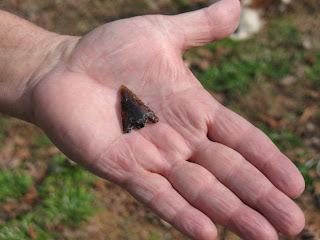When I'm doing wilderness survival projects, I usually try to do them as if I have no tools other than my pocket knife and no raw materials other than what I can forage in the wilderness. I do this so I can master skills in a worst case scenario; sort of a "naked into the wilderness" mind-set. But, trust me, if I ever find myself in a true survival situation; I will use anything and everything that I can find to survive.
Jesus said that "the poor shall be with ye always." He could have easily said that "trash shall be with ye always." There is hardly a place left in the world where man has not left his debris. I recently read that they were having a clean-up day on Mount Everest to clear away all of the trash and discarded oxygen bottles that climbers have left on the mountain. Mount Everest for Pete's sake!!!! If the top of Mount Everest is trashed out, what part of the world is free from liter?
What I'm getting at is that even though you are lost in the wilderness you will probably come across items that have been discarded by other humans. If you find something that you can use to help you survive, use it. Let me give you an example. This wasn't really a survival situation, but it will illustrate my point. A friend and I were back-packing in Colorado some years back. We had brought plenty of food with us, but we hadn't brought any fishing gear. We were up in the mountains about twenty miles from the closest town, and we were hiking along next to a beautiful mountain stream. The stream was teaming with trout, and we were sick of freeze-dried food, but as stated earlier we had no fishing gear. Jim knew that where there were trout, there had to have been trout fishermen, and sure enough, in no time he found some broken and discarded fishing line that still had a hook on it. Jim turned over a rotten log, located a few grubs, and using his scavenged equipment as a hand line caught three nice trout. Trout for dinner thanks to someone else's trash.
Here are just a few examples of how you can turn trash into valuable survival equipment:
Beer Bottles
Here I've carved a wooden stopper, attached a piece of yucca cordage, and made a very handy survival canteen out of a discarded beer bottle.
The bottom of a broken beer bottle can be used to make an effective arrow point.
Broken glass can also be used for skinning game, or it can be used as a scraper for making arrows and etc.
Plastic Bottles
Plastic bottles can be used to store and transport water. Two-liter bottles can be turned into effective minnow traps.
Old Cans
An old can and a piece of rusty wire can make a serviceable cook pot. You can boil water in a can to purify it for drinking or use the can as a container when gathering wild edibles.
Remove the pull tab from an aluminum drink can and attach a fishhook to it to make an artificial lure.
CD’s
Much has been made of using an old CD for a signal mirror to signal aircraft. This can be done, but a CD is far less efficient than a mirror. Never the less, a CD is far better than nothing at all. Pictured below: top, a CD and a real mirror; bottom, the light that they produce when shone on the side of a house fifty feet away. CD flash is on the left, Mirror flash on the right.
Plastic Bags
These things are everywhere. When I go canoeing I see them draped in trees where the high water has left them. Plastic bags can be used hold wild plants as you gather them. If there is a chance of rain, you can gather dry fire tinder and store it in a plastic bag to keep it dry. A plastic bag makes a good emergency rain hat. Fashion a hood out of a plastic bag to help cut the wind and retain heat that radiates off of your head. Plastic bags stuffed with cattail down or shredded cedar bark can be worn over the hands as emergency mittens to prevent frostbite. A large plastic bag can be used as a poncho, a ground cloth, or an emergency tarp. A plastic bad can be sealed over the live foliage of a tree limb to act as a mini-solar still for collecting water. Please note that you don’t get much water from one of these, so ties on as many as you can find. Plastic grocery bags can be twisted up into light-duty cordage. Pictured below: Four feet of cordage made from one grocery bag
Remember, your mind is your most important survival tool. Learn to think outside the box, and use anything that you can find, natural or man-made, to help you survive.
Sunday, May 13, 2012
Subscribe to:
Post Comments (Atom)












1 comment:
Wow there are some really great ideas there! I have spent hours researching edible plants and ways to collect water in the bush but I would never have thought of using other people's junk!
Post a Comment